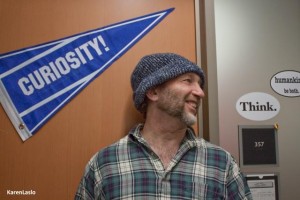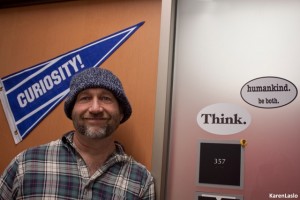In an “Environmental Ethics” class of 10 students who would rather be sleeping, it’s a few minutes before 8 a.m. when Randy Larsen enters, exclaiming “good morning scholars!” with a wide grin and scruffy beard. Pulling up a chair to the family-dinner-style seating arrangement, Larsen begins class with his usual pep (and his red, ceramic coffee mug, of course).

Randy Larsen
When interrupted by a student trailing into class late, he greets the tardy student with a genuine, “thanks for coming,” then proceeds teaching. Sporting a plain T-shirt, patched denim, and a neon-green knit hat, his appearance sums up his personality and teaching style quite well — unconventional and refreshingly simple.
Although Larsen is a philosophy professor at Chico State, he is also a forever student. His Ph.D. is in environmental studies with expertise in environmental virtue ethics, but he’s had about 17 years of graduate education of many kinds.
It’s surely an ambitious amount of schooling, but he talks about it casually: “I’m not done yet. I’ll probably do more.”
Larsen hosted “Eco Talk” for 12 years on KZFR, 90.1 FM, including seven years that the show was syndicated. He said he stepped away from the program in order to finish his doctoral dissertation.
For Larsen, becoming a professor was a way to bide his time doing something else while figuring out what that “something else” was. Like many 20-somethings, he was still finding his niche, but instead of panicking about it, he actively and patiently pursued it.
“I knew at a very young age that I was different than my brother and sister,” he noted. In Antioch, Calif., Larsen grew up the youngest of four children and was always drawn to the natural world. In fact, he always thought he would end up being a park ranger. However, somewhere along the way, he realized he wanted to focus on helping the natural world, rather than just enjoying it.
Lobbying with the Sierra Club became Larsen’s first major step in his journey towards “something else.” In the mid-‘80s, activists were fighting to stop a ski resort from being built next to Yellowstone National Park. As the campaign persisted, it became apparent that the arguments used to win the battle were selective and, in Larsen’s mind, raised ethical questions. He felt the arguments were necessary in order to win, but it spoke volumes about a bigger problem in how “the system is so screwed up.”
“I lost my appetite for lobbying,” he said. “It was a successful outcome, but I felt sick to my stomach.”
Feeling sleazy after partaking in what he viewed as a corrupt system, Larsen decided to go backpacking on the Kalalau trail in Hawaii, bringing the book, “Environmental Ethics” by Holmes Rolston III. After just a few days, he finished the dense text and concluded that he wanted to study with Rolston. So, he did, and then it was clear what this “something else” was: environmental ethics.
He didn’t stop at Hawaii, though. Traveling mostly for environmental work continued, and he’s been to almost every country in Latin America, each one stimulating different growth and insight. One profound memory he has is from time spent in Guatemala, a country where poverty and homelessness thrive.
As he and others were brainstorming ways to help the Guatemalan homeless population, his mind kept wandering to a certain species of endangered ducks.

‘What about this duck?’
He recalled, “I thought, ‘Oh my god, there’s so many people focused on these homeless kids, including me. What about this duck?’”
Caring more about the natural world than humans wasn’t a new feeling for him, but it did solidify his direction in life. He summed it up as a moment of clarity: “It just dawned on me, ‘Like, oh, wow! See how I am?’”
Within environmental ethics, Larsen finds himself most connected to virtue ethics, an area that differs significantly from most rule-based philosophical areas. The practice of virtue ethics focuses on an individual’s character and constant striving for excellence, rather than strict concepts of right and wrong.
Another practice closely related to Larsen’s area of expertise is Buddhist meditation. In philosophy, the ultimate question is “how ought we to live?” Now 56 years wise, Larsen believes that practicing self-excellence is what we all can do. One piece of advice he wishes everyone would follow is to meditate.
“This moment, this experience, right now, inward — to me, that makes sense.”
Of all the things Larsen has studied and wishes to study, he feels most excited about one concept.
“Peace of mind — I think that’s the destination.”
Hannah Panten, who is from La Crescent, Minn., is a sophomore journalism major at Chico State. She wrote this profile for Dave Waddell’s “Writing for the Mass Media” class.
